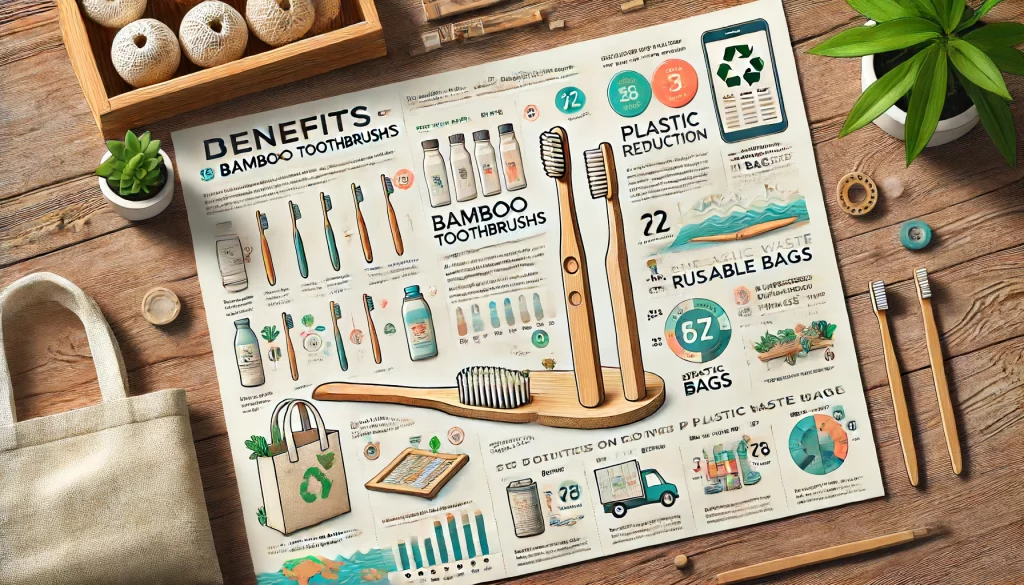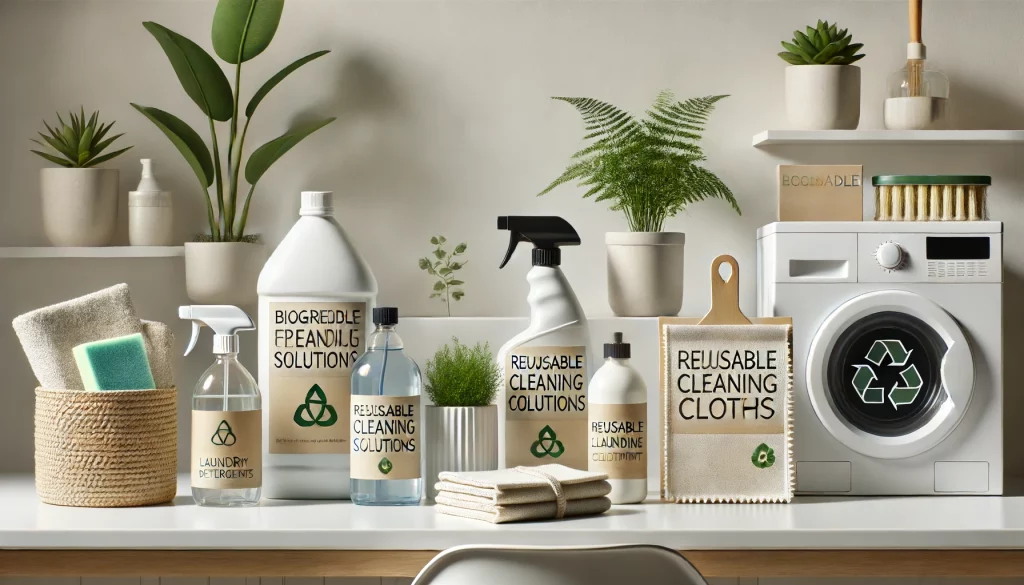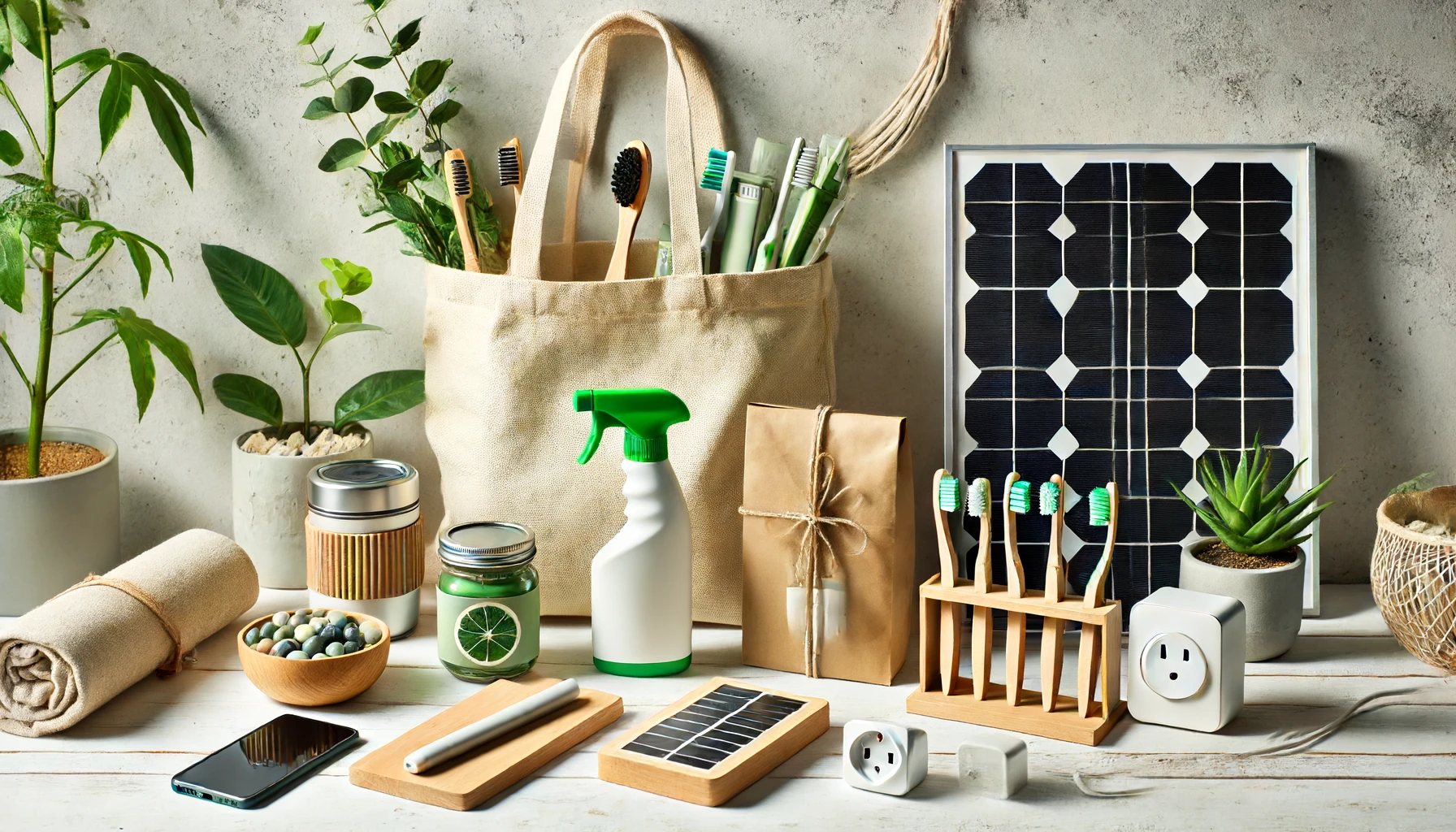Introduction
As we move into 2024, the importance of adopting eco-friendly products in our daily lives cannot be overstated. With climate change and environmental degradation becoming ever more pressing issues, every small step toward sustainability counts. Eco-friendly products not only help reduce our carbon footprint but also promote a healthier lifestyle and support the growing green economy. This article highlights some of the top eco-friendly products you should consider using in 2024 to make a positive impact on the planet.
1. Reusable Household Items
Reusable Bags: Single-use plastic bags are one of the largest contributors to environmental pollution. Reusable bags, made from materials like cotton or recycled plastics, are durable and can significantly reduce plastic waste. They come in various sizes and designs, making them a practical and stylish alternative. Switching to reusable bags not only reduces the amount of plastic that ends up in landfills and oceans but also cuts down on the resources needed to produce disposable bags. For more on the impact of reusable bags, see National Geographic.
Metal or Bamboo Straws: Plastic straws are a major pollutant in oceans, harming marine life. Switching to metal or bamboo straws is a simple yet effective way to reduce plastic waste. These straws are easy to clean and can be used multiple times. They also often come with cleaning brushes, making them convenient for daily use. By opting for metal or bamboo straws, you can significantly reduce the number of plastic straws that contribute to ocean pollution. Learn more from The Last Plastic Straw.

Glass Storage Containers: Ditching plastic containers in favor of glass ones helps reduce plastic pollution and is healthier for food storage. Glass containers are durable, non-toxic, and can be used in microwaves and dishwashers without leaching harmful chemicals into your food. They also do not absorb odors or stains, making them ideal for long-term use. For tips on transitioning to glass storage, check out Zero Waste Home.
2. Sustainable Personal Care Products
Bamboo Toothbrushes: Traditional plastic toothbrushes are a significant source of waste. Bamboo toothbrushes are biodegradable and just as effective in maintaining oral hygiene. They decompose naturally, reducing landfill waste. Additionally, bamboo is a sustainable material that grows quickly and requires minimal resources. Switching to bamboo toothbrushes is a small but impactful change you can make in your personal care routine. More information can be found at Brush with Bamboo.
Natural Deodorants: Many conventional deodorants contain harmful chemicals that can affect your health and the environment. Natural deodorants, made from organic ingredients, are free from aluminum and synthetic fragrances, making them a safer choice. These deodorants often use baking soda, arrowroot powder, and essential oils to provide effective odor control. By choosing natural deodorants, you reduce exposure to potentially harmful substances and support sustainable product development. For recommendations, see Environmental Working Group.
Refillable Beauty Products: The beauty industry generates a lot of plastic waste through packaging. Refillable beauty products allow you to reuse the containers, reducing waste. Many brands now offer refillable options for products like shampoos, lotions, and makeup. This practice not only cuts down on plastic waste but also encourages a culture of sustainability in the beauty industry. Explore refillable options from brands like Lush and Follain.
3. Eco-friendly Cleaning Products
Biodegradable Cleaning Solutions: Conventional cleaning products often contain harsh chemicals that can harm the environment. Biodegradable cleaning solutions are made from natural ingredients that break down easily, minimizing their impact on the ecosystem. These products are often just as effective as their conventional counterparts but without the harmful side effects. Switching to biodegradable cleaners helps protect water sources and reduces pollution. For eco-friendly cleaning tips, visit Ecover.
Reusable Cleaning Cloths: Instead of single-use paper towels, opt for reusable cleaning cloths. Made from materials like bamboo or organic cotton, these cloths are durable, absorbent, and can be washed and reused multiple times. This reduces the waste generated by disposable paper products and cuts down on deforestation. Reusable cleaning cloths are a simple switch that can make a significant environmental impact. Learn more from The Sustainable Shopper.

Eco-friendly Laundry Detergents: Many laundry detergents contain phosphates and other harmful chemicals. Eco-friendly laundry detergents are biodegradable and free from toxic substances, making them safer for the environment and your skin. These detergents are often plant-based and packaged in recyclable materials, further reducing their environmental footprint. For recommendations on eco-friendly laundry detergents, check out Seventh Generation.
4. Green Technology Gadgets
Solar-powered Chargers: Solar-powered chargers harness the energy of the sun to power your devices, reducing reliance on electricity. These chargers are portable, making them ideal for travel and outdoor activities. By using solar energy, you decrease your carbon footprint and promote the use of renewable resources. Explore solar charger options at Goal Zero.
Energy-efficient Appliances: Investing in energy-efficient appliances helps reduce electricity consumption and lowers utility bills. Look for appliances with the ENERGY STAR label, which signifies high efficiency and lower environmental impact. Energy-efficient appliances not only save money but also contribute to reducing greenhouse gas emissions. Learn more from Energy Star.
Smart Thermostats: Smart thermostats help manage home heating and cooling more efficiently. They learn your schedule and adjust the temperature accordingly, saving energy and reducing carbon emissions. Smart thermostats can be controlled remotely via smartphone apps, providing convenience and energy savings. Discover smart thermostat options at Nest.
5. Sustainable Fashion
Clothing from Recycled Materials: Brands are increasingly producing clothing from recycled materials like plastic bottles and old garments. These clothes are stylish and help reduce textile waste. By supporting brands that use recycled materials, you promote a circular economy and reduce the demand for new resources. Check out sustainable clothing brands like Patagonia and Girlfriend Collective.
Organic Cotton Apparel: Conventional cotton farming uses a lot of pesticides and water. Organic cotton is grown without harmful chemicals and uses less water, making it a more sustainable option. Organic cotton clothing is better for your skin and the environment. For organic cotton apparel, visit Pact.
Eco-friendly Footwear: Shoes made from sustainable materials like recycled rubber, organic cotton, and plant-based fabrics are becoming more popular. These materials reduce environmental impact and are often more durable than conventional options. By choosing eco-friendly footwear, you support sustainable practices in the fashion industry. Explore options from brands like Allbirds and Veja.
Conclusion
Adopting eco-friendly products is a powerful way to contribute to environmental sustainability. By making small changes in our daily lives, such as using reusable bags, switching to natural personal care products, and choosing energy-efficient appliances, we can significantly reduce our ecological footprint. As consumers, our choices drive demand and can influence the market towards more sustainable practices. Embrace these eco-friendly products in 2024 and join the movement towards a greener, healthier planet.
FAQs: Top Eco-friendly Products to Use in 2024
1. What are the benefits of using reusable bags instead of plastic bags?
Reusable bags offer several environmental benefits over single-use plastic bags. They reduce the amount of plastic waste that ends up in landfills and oceans, where it can take hundreds of years to decompose. Reusable bags also cut down on the resources needed to produce plastic bags, including petroleum. Additionally, they are often more durable and can carry heavier loads, making them a practical and eco-friendly choice. Learn more about the impact of reusable bags from National Geographic.
2. How do bamboo toothbrushes compare to plastic toothbrushes in terms of effectiveness and environmental impact?
Bamboo toothbrushes are just as effective as plastic toothbrushes in maintaining oral hygiene. They have soft or medium bristles similar to those found in plastic toothbrushes and are designed to clean teeth efficiently. Environmentally, bamboo toothbrushes are far superior because they are biodegradable and can be composted after use, unlike plastic toothbrushes, which can take hundreds of years to decompose and contribute significantly to landfill waste. For more information, visit Brush with Bamboo.
3. Are natural deodorants as effective as conventional deodorants?
Natural deodorants can be just as effective as conventional deodorants in controlling body odor. They often use ingredients like baking soda, arrowroot powder, and essential oils to neutralize odor without the use of aluminum and synthetic fragrances, which are common in conventional deodorants. While the effectiveness can vary depending on the individual and the specific product, many people find that natural deodorants work well for their needs and offer the added benefit of being free from potentially harmful chemicals. For recommendations and reviews, check out Environmental Working Group.
4. What makes eco-friendly cleaning products better for the environment?
Eco-friendly cleaning products are made from natural, biodegradable ingredients that break down easily and do not harm the environment. They avoid harsh chemicals found in conventional cleaners that can pollute water sources and harm wildlife. By using eco-friendly cleaning products, you help reduce the release of toxic substances into the environment and promote a healthier ecosystem. These products are often packaged in recyclable or minimal packaging, further reducing their environmental impact. For eco-friendly cleaning tips, visit Ecover.
5. How do energy-efficient appliances contribute to environmental sustainability?
Energy-efficient appliances consume less electricity compared to standard appliances, reducing overall energy demand. This lower energy consumption translates to fewer greenhouse gas emissions from power plants, which are a major contributor to climate change. Energy-efficient appliances also help consumers save on utility bills and reduce their carbon footprint. The ENERGY STAR label is a reliable indicator of an appliance’s efficiency and environmental impact. Learn more about the benefits of energy-efficient appliances at Energy Star.
